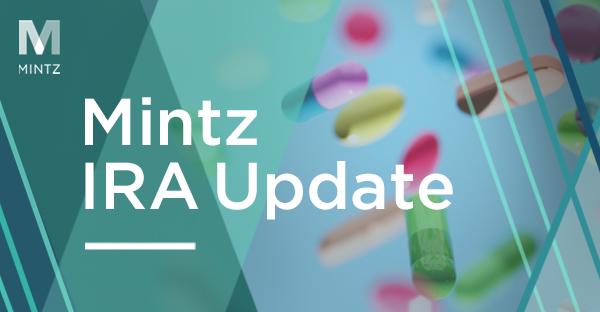
Stephnie focuses her practice on advising clients across the health care industry on regulatory, transactional, and compliance matters. She serves as regulatory counsel to private equity firms and other investors in transactions involving a range of health care targets, including health care systems and other health care providers, PBMs, pharmacies, nurse staffing companies, and laboratories. She regularly advises pharmacies, PBMs, third party payors, digital health companies, value-based contracting entities, and care providers on regulatory matters. With her previous experience at a state Medicaid agency and the Medicare Appeals Council, she is able to strategically advise clients on regulatory and compliance issues relating to Medicare and Medicaid.
Prior to joining Mintz, Stephnie was an attorney advisor at the Office of General Counsel of the DC Department of Health Care Finance. Stephnie provided DC’s Medicaid agency with legal and compliance counsel and defended it in administrative proceedings, including provider appeals of Medicaid payment suspensions based on allegations of fraud and pharmacy overpayment recoupments identified by state Medicaid audit. During the COVID-19 pandemic, Stephnie helped to ensure the agency’s compliance with the CARES Act. Earlier, Stephnie was an associate at Healthcare Legal Solutions, LLC, where she reviewed hospital and health care providers’ medical claims and billing practices, drafted administrative appeals on behalf of providers, and strategized with clients to ensure compliance with Medicare and Medicaid regulations and reduce payment denials.
While attending George Washington University School of Law, Stephnie was managing editor of the Federal Circuit Bar Journal. She also served as a legal extern for the Medicare Appeals Council, housed under the Departmental Appeals Board at the Department of Health and Human Services, and clerked for two law firms in the Washington metropolitan area.
Not admitted to practice law in New York. Admitted to practice only in the District of Columbia.
viewpoints
Mintz IRA Update — The IRA in 2025: The Future of Medicare Part D
February 13, 2025 | Article | By Stephnie John, Abdie Santiago
Read about the impact of changes to Medicare Part D’s Part D benefit redesign and other changes that went into effect on January 1, 2025, and additional changes to watch for in 2025.
Mintz IRA Update — Fourth Edition: Q1 2025
February 13, 2025 | Article | By Rachel A. Alexander, Theresa Carnegie, Tara E. Dwyer, Lauren Moldawer, Hassan Shaikh, Stephnie John, Madison Castle, Mitchell Clough, Xavier Hardy, Samantha Hawkins, Alexander Hecht, Abdie Santiago
Mintz’s Pharmacy Benefits and PBM Contracting Practice is pleased to present the ‘Fourth Edition: Q1 2025’ of our Mintz IRA Update, a regular publication that delves into developments of the Inflation Reduction Act of 2022 (IRA) and their impact on pharmaceutical supply chain stakeholders.
PBM Policy and Legislative Update — Winter 2025
February 10, 2025 | Blog | By Theresa Carnegie, Tara E. Dwyer, Rachel A. Alexander, Lauren Moldawer, Bridgette Keller, Priyanka Amirneni, Madison Castle, David Gilboa, Xavier Hardy, Samantha Hawkins, Stephnie John, Alison H. Peters, Pamela Polevoy, Abdie Santiago, Hassan Shaikh, Sophia Temis
The PBM Policy and Legislative Update — Winter 2025 edition builds upon prior PBM Policy and Legislative Updates and summarizes activity from October through December (2024) that affects the PBM industry. It highlights (i) federal activities, (ii) state activities, and (iii) other noteworthy events and trends affecting the PBM industry.
PBM Policy and Legislative Update — Fall 2024
November 22, 2024 | Blog | By Rachel A. Alexander, Tara E. Dwyer, Theresa Carnegie, Bridgette Keller, Madison Castle, David Gilboa, Xavier Hardy, Samantha Hawkins, Stephnie John, Lauren Moldawer, Alison H. Peters, Abdie Santiago, Hassan Shaikh, Sophia Temis
Building upon prior issues and summarizing activity from July through September, the Fall 2024 PBM Update highlights federal legislative activity and oversight, state legislative activity and oversight, and other noteworthy events and trends affecting the PBM industry.
California’s Health Care Transactions Review Law: Regulatory Revisions Effective Immediately
August 26, 2024 | Blog | By Kathryn Edgerton, Deborah Daccord, Stephnie John, Pamela Polevoy
Effective immediately, on August 22, 2024, the Office of Health Care Affordability (OHCA) adopted revisions to the cost and market impact review (CMIR) regulations (Revised Regulations), which govern California’s pre-closing health care transaction review process. As discussed in our prior post, certain health care entities must provide OHCA with notice of a transaction at least 90 days prior to closing. The Revised Regulations, among other things: (1) expand who must file a notice; (2) narrow the applicability of the health care professional shortage area threshold; (3) clarify calculation of California-derived revenue; (4) clarify confidentiality of expedited review request documents; and (5) add a required attestation.
PBM Policy and Legislative Update — Summer 2024
July 31, 2024 | Blog | By Theresa Carnegie, Tara E. Dwyer, Rachel A. Alexander, Bridgette Keller, Madison Castle, David Gilboa, Xavier Hardy, Samantha Hawkins, Stephnie John, Pat Ouellette, Alison H. Peters, Abdie Santiago, Hassan Shaikh, Sophia Temis
Mintz IRA Update — Third Edition: Q2 2024
July 15, 2024 | Blog | By Rachel A. Alexander, Theresa Carnegie, Madison Castle, Mitchell Clough, Tara E. Dwyer, David Gilboa, Xavier Hardy, Samantha Hawkins, Stephnie John, Bridgette Keller, Lauren Moldawer, Abdie Santiago, Hassan Shaikh
In ‘Third Edition: Q2 2024’ of the Mintz IRA Update, we cover updates to the Medicare Drug Price Negotiation Program being considered by CMS, developments in litigation challenging the program, the consequences and costs of redesigning the Part D program, opposition to the use of march-in rights to lower drug prices, and the growing use of state prescription drug affordability boards.
Mintz IRA Update — Learning From Experience: Medicare Drug Price Negotiation Program Updates
July 15, 2024 | Blog | By Stephnie John, Samantha Hawkins, Madison Castle
Mintz IRA Update — The Consequences and Costs of Redesigning the Part D Program
July 15, 2024 | Blog | By Tara E. Dwyer, Lauren Moldawer, David Gilboa, Samantha Hawkins, Stephnie John, Matthew Tikhonovsky
Read about the 2025 redesign of the Medicare Part D program pursuant to the Inflation Reduction Act of 2022 and how those changes impact Medicare Part D plan sponsors, beneficiaries, and manufacturers.
Mintz IRA Update — Opposition to the Use of March-In Rights to Lower Drug Prices
July 15, 2024 | Blog | By Stephnie John
News & Press
Mintz Advises TPG on Sale of Equity Interest in OneOncology to Cencora
December 17, 2025
Mintz advised TPG on Cencora’s acquisition of TPG’s equity interest in OneOncology, a physician-led national platform empowering independent medical specialty practices rooted in oncology. The transaction follows a period of significant physician-led investment and growth for the platform.
A Mintz team led by Richard Gervase, Member and Chair of the firm’s Royalty & Revenue Interest Financing Transactions Group, advised global investment firm Sixth Street in a non-dilutive, senior secured credit facility of up to $475 million for Apellis Pharmaceuticals. Apellis received $375 million in funding at close, with ability to access an additional $100 million under the facility at the Company’s option prior to September 2025, subject to the satisfaction of certain conditions.
podcasts
Health Law Diagnosed – New Year's Gratitude
February 3, 2025 | Podcast | By Bridgette Keller, Alison H. Peters, Samantha Kingsbury, Theresa Carnegie, Joanne Hawana, Abdie Santiago, Stephnie John, Pamela Polevoy, Karen Lovitch, Jean D. Mancheno, Deborah Daccord, Rachel A. Alexander, Jane Haviland, David Gilboa, Kathryn Edgerton, Hassan Shaikh, Madison Castle, Laurence Freedman, Priyanka Amirneni, Samantha Hawkins, Tara E. Dwyer, Rachel Yount, Sophia Temis, Xavier Hardy
Host Of Counsel Bridgette Keller invites the Mintz Health Law team to reflect on what they’re grateful for as they prepare for the year ahead. Hear from a dynamic group of Members, Of Counsel, and Associates as they share their perspectives on what’s coming up over the horizon.
Health Law Diagnosed — Mintz Health Law Team: Reflecting on What We Are Grateful For
February 5, 2024 | Podcast | By Bridgette Keller
As the Mintz Health Law team welcomes the beginning of 2024, many of its members take a moment to reflect on the exciting growth of the Health Law Practice, opportunities to partner with clients on complex legal issues, and the celebration of numerous milestones.
Mintz Health Law: What We Are Grateful For
January 11, 2023 | Podcast | By Bridgette Keller
Bridgette Keller speaks with the Mintz Health Law team about what they are grateful for as they look back on a year of client service, mentorship, and working together as a team.
Health Law Diagnosed — Key Takeaways from the 6th Annual Pharmacy & Pharmaceutical Industry Summit
April 7, 2022 | Podcast | By Stephnie John, Bridgette Keller, Hassan Shaikh
Listen to our team discuss key takeaways from the weeklong summit and how industry trends are impacting business practices.
Recognition & Awards
Summer Public Interest Fellow, South Asian Bar Association (2015)
Involvement
- Legal Counsel, Dil to Dil, a nonprofit organization dedicated to South Asian mental health advocacy
- Member, American Health Law Association





